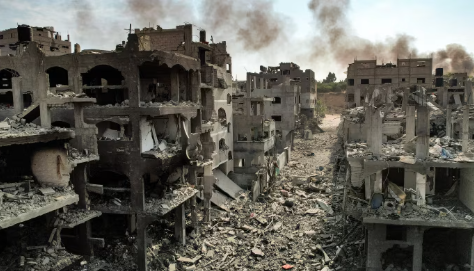Who Will Fund the Reconstruction of Gaza After the Conflict?
The destruction in Gaza caused by ongoing conflicts has left a deep impact on its infrastructure, economy, and the lives of its people. As the world watches the aftermath, the question arises: who will bear the cost of rebuilding Gaza? With entire neighborhoods leveled, hospitals and schools destroyed, and critical infrastructure shattered, the financial burden for reconstruction will be monumental. Various parties, both governmental and non-governmental, international and local, will likely be involved in the funding process. However, the question of who will pay remains complex and highly debated.
1. International Aid and Donor Countries
Historically, international donors have played a significant role in funding Gaza’s reconstruction efforts after previous conflicts. The United Nations, the World Bank, and various international NGOs have often been the driving forces behind the rebuilding of Gaza’s infrastructure. Countries such as Qatar, Turkey, and the United Arab Emirates (UAE) have also been major contributors. These nations, alongside global powers like the United States and European Union members, are expected to continue their financial support for reconstruction.
International aid has often been tied to political considerations, with some nations providing funds as a way to influence the political dynamics of the region. For instance, some Middle Eastern countries have used their financial aid to strengthen their ties with the Palestinian Authority or to counterbalance other geopolitical influences in the region. This complexity raises questions about the reliability and long-term sustainability of international support for Gaza.
2. The Role of the United Nations (UN) and Other International Organizations
The United Nations Relief and Works Agency (UNRWA) has long been involved in providing humanitarian assistance to Palestinians in Gaza and the West Bank. In the aftermath of conflict, the UN is likely to play a key role in providing aid for rebuilding efforts. The UN’s Office for the Coordination of Humanitarian Affairs (OCHA) will likely spearhead the efforts to mobilize resources, coordinate the distribution of aid, and provide logistical support to local authorities and organizations working on the ground.
Additionally, the World Bank has previously committed funds to Gaza’s reconstruction, particularly in the aftermath of major conflicts. These funds are usually directed toward rebuilding infrastructure, such as schools, hospitals, and roads, along with providing financial support for Gaza’s struggling economy.
However, many challenges exist. The political situation, including restrictions imposed on the movement of people and goods, can impede aid delivery. Moreover, the political division between the Palestinian Authority in the West Bank and Hamas in Gaza further complicates the distribution and management of funds.
3. Private Sector and International Corporations
In addition to government aid and international organizations, the private sector also has a role to play in Gaza’s reconstruction. International corporations, especially those in the construction, telecommunications, and energy sectors, could be critical in rebuilding the infrastructure of Gaza. Companies in the region have, in the past, offered some assistance through partnerships with international bodies or by providing expertise and technical support.
The private sector can also contribute by facilitating job creation, which is crucial for Gaza’s long-term recovery. The rebuilding process will require a substantial workforce, and employment opportunities in construction, engineering, and other industries will not only help to revive the local economy but also provide much-needed income for families devastated by the conflict. However, the ability of the private sector to invest in Gaza depends on political stability and the removal of certain restrictions that limit economic activities in the region.
4. Local Palestinian Resources and Internal Funding
Although Gaza is heavily dependent on foreign aid, the local government and Palestinian people themselves will also play an important role in rebuilding efforts. The Palestinian Authority (PA) in the West Bank, despite its limited control over Gaza, may provide some financial support. However, their ability to contribute significantly to the reconstruction will be hindered by their own financial difficulties and internal political challenges.
Local Palestinian businesses, non-governmental organizations (NGOs), and community groups will also be instrumental in the rebuilding process. These entities have deep connections within the community and can provide both financial resources and volunteer manpower to assist with recovery efforts. However, the absence of a stable economy in Gaza and the ongoing blockade have hampered the ability of local resources to make a meaningful impact.
5. Challenges to Gaza’s Reconstruction Efforts
The primary challenge to rebuilding Gaza is the political divide between the Palestinian factions. The tension between Hamas, which controls Gaza, and the Palestinian Authority, based in the West Bank, often hinders cooperation on key issues, including financial aid and reconstruction planning. Donor nations and international organizations are also cautious about where the funds go, fearing they may be mismanaged or diverted by political groups.
Furthermore, the blockade imposed by Israel, which restricts the movement of goods and people in and out of Gaza, continues to limit the effectiveness of aid. Reconstruction materials such as cement and steel are often delayed or prevented from entering the region, making it extremely difficult to rebuild key infrastructure. This blockade not only limits reconstruction efforts but also exacerbates the economic hardships faced by the people of Gaza.
6. Conclusion: A Collaborative Effort
Rebuilding Gaza will require a concerted effort from the international community, local Palestinian entities, the private sector, and regional powers. Financial contributions will be necessary, but so will political will and diplomatic negotiations. The path to rebuilding Gaza is fraught with obstacles, including political divisions and external pressures. However, with effective cooperation, it may be possible to create a sustainable and prosperous future for the people of Gaza.
In conclusion, the question of who will pay for the reconstruction of Gaza is not only a financial one but also a political and humanitarian challenge. A collaborative, transparent, and long-term approach will be essential to ensuring that Gaza’s reconstruction is both feasible and effective.


Leave a Comment